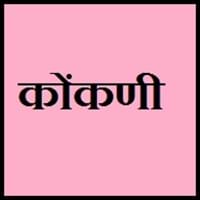Konkani and Filipino
Countries
India
Philippines
National Language
India
Philippines
Second Language
Not spoken in any of the countries
Philippines
Speaking Continents
Asia
Asia
Minority Language
Not spoken in any of the countries
Not spoken in any of the countries
Regulated By
Govenment of Goa
Komisyon sa Wikang Filipino
Interesting Facts
- Fr. Thomas Stevan wrote the first book in Konkani in 1651.
- Sahitya Academy recognized konkani as a language in year 1976.
- "Filipino" was officially declared as national language by the constitution in 1987.
- "Filipino" is the official name of Tagalog, or synonym of it.
Similar To
Marathi
Tagalog Language
Derived From
Sanskrit Language
Spanish Language
Alphabets in
Kokani-Alphabets.jpg#200
Filipino-Alphabets.jpg#200
Writing Direction
Left-To-Right, Horizontal
Not Available
Thank You
Dev Borem Korum
Salamat
How Are You?
kaso assa?
Kumusta
Good Night
Rati Boren Zavonn
magandang gabi
Good Evening
Sanj Borem Zavonn
Magandang gabi
Good Afternoon
Not Available
Magandang hapon
Good Morning
Dis Borem Zavonn
Magandang umaga
Sorry
Maf kor
pinagsisisihan
I Love You
hav tujo mog korta.
Mahal kita
Excuse Me
upkar korxi
patawarin ninyo ako
Where They Speak
Goa
Philippines
Dialect 2
Not present
Hiligaynon
Where They Speak
Not Available
Philippines
How Many People Speak
Not Available
Dialect 3
Not present
Waray
Where They Speak
Not Available
Philippines
How Many People Speak
Not Available
Speaking Population
Not Available
Second Language Speakers
Not Available
Native Name
Kōṅkaṇī
filipino
Alternative Names
Konkan standard, Bankoti, Kunabi, North Konkan, Central Konkan, Concorinum, Cugani, Konkanese
Pilipino
French Name
konkani
filipino; pilipino
German Name
Konkani
Pilipino
Pronunciation
kõkɳi
[ˌfɪl.ɪˈpiː.no]
Ethnicity
Konkanis
Not Available
Origin
1209 A.D.
16th Century
Language Family
Indo-European Family
Austronesian Family
Subgroup
Not Available
Not Available
Branch
Not Available
Not Available
Early Forms
No early forms
No early forms
Standard Forms
Kokani
Filipino
Signed Forms
Indian Signing System (ISS)
Not Available
Scope
Individual, Macrolanguage
Individual
ISO 639 1
No data available
No Data Available
ISO 639 6
Not Available
Not Available
Glottocode
goan1235
fili1244
Linguasphere
No data available
No Data Available
Language Type
Living
Living
Language Linguistic Typology
Subject-Object-Verb
Not Available
Language Morphological Typology
Not Available
Not Available
All Konkani and Filipino Dialects
Most languages have dialects where each dialect differ from other dialect with respect to grammar and vocabulary. Here you will get to know all Konkani and Filipino dialects. Various dialects of Konkani and Filipino language differ in their pronunciations and words. Dialects of Konkani are spoken in different Konkani Speaking Countries whereas Filipino Dialects are spoken in different Filipino speaking countries. Also the number of people speaking Konkani vs Filipino Dialects varies from few thousands to many millions. Some of the Konkani dialects include: Antruz Filipino dialects include: Bikol , Hiligaynon. Also learn about dialects in South American Languages and North American Languages.
Konkani and Filipino Speaking population
Konkani and Filipino speaking population is one of the factors based on which Konkani and Filipino languages can be compared. The total count of Konkani and Filipino Speaking population in percentage is also given. The percentage of people speaking Konkani language is 0.11 % whereas the percentage of people speaking Filipino language is Not Available. When we compare the speaking population of any two languages we get to know which of two languages is more popular. Find more details about how many people speak Konkani and Filipino on Konkani vs Filipino where you will get native speakers, speaking population in percentage and native names.
Konkani and Filipino Language Codes
Konkani and Filipino language codes are used in those applications where using language names are tedious. Konkani and Filipino Language Codes include all the international language codes, glottocodes and linguasphere.





